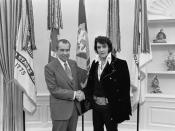The 1970s were times of chaotic events held over from the chaos of the 1960s. The 70s brought Americans an end to the Vietnam War and a change in the political and social perspectives, another presidency term with Richard M. Nixon, and his policies of engagement, and the Watergate scandal, leading to the first resignation of an American President. The end of the Vietnam War led to political and social fallout around the globe, especially in America. All of the chaos of the 1970s also led Americans to have a changed perspective in their government. People were beginning to notice similarities between Nixon's policies of engagement and strategies used during the Cold War, and the aftermath of the Watergate scandal led many American's to doubt the role of their government and its power.
In 1969, Nixon built his presidential campaign on the idea of ending the Vietnam War. Early in his administration, the president outlined a foreign policy based on a "low profile" and on reductions in the U.S.
role abroad. Many believe this was the reason for Nixon's election. Fed up with the war in Vietnam, Americans were ready to get our soldiers home. Nixon considered his engagement strategy "peace with honor." Nixon's priority was the settlement of the Vietnam crisis while using the "peace with honor" code. Nixon found an ally in Henry Kissinger who was the Nation Security Advisor and working together to end the crisis in Vietnam. One strategy was called "Vietnamization," a carrot on a stick method, which would to gradually move the troops away and force the South Vietnamese to fight for themselves in order to advance peace talks in Paris. (Davidson et al., 2002 pg 895) The truth of the matter is that Nixon continued with the Vietnam War for nearly four...


